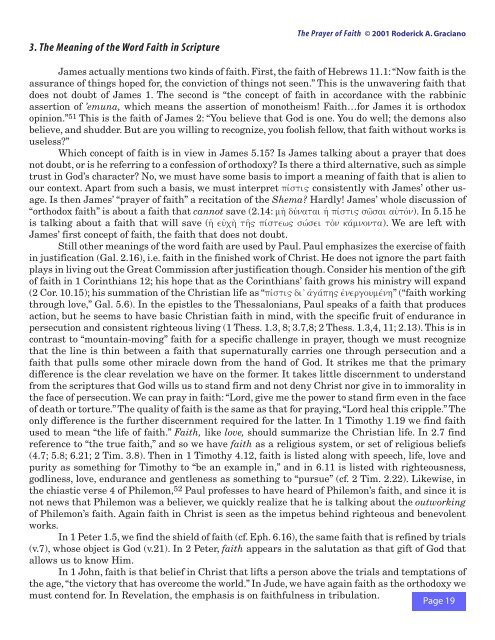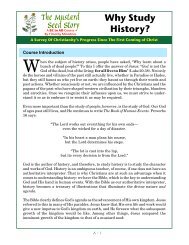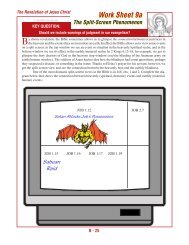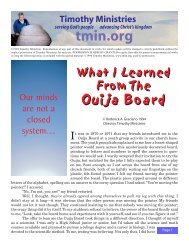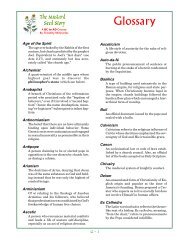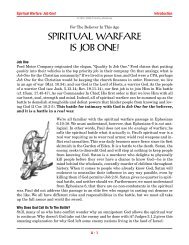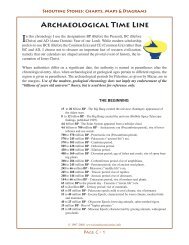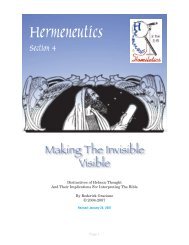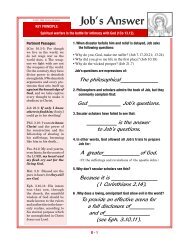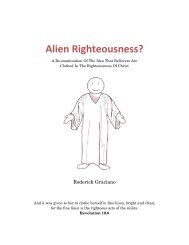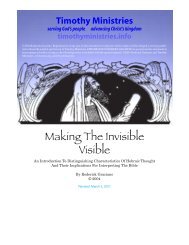The Prayer of Faith and Healing In James 5 - Timothy Ministries
The Prayer of Faith and Healing In James 5 - Timothy Ministries
The Prayer of Faith and Healing In James 5 - Timothy Ministries
You also want an ePaper? Increase the reach of your titles
YUMPU automatically turns print PDFs into web optimized ePapers that Google loves.
3. <strong>The</strong> Meaning <strong>of</strong> the Word <strong>Faith</strong> in Scripture<br />
<strong>The</strong> <strong>Prayer</strong> <strong>of</strong> <strong>Faith</strong> © 2001 Roderick A. Graciano<br />
<strong>James</strong> actually mentions two kinds <strong>of</strong> faith. First, the faith <strong>of</strong> Hebrews 11.1: “Now faith is the<br />
assurance <strong>of</strong> things hoped for, the conviction <strong>of</strong> things not seen.” This is the unwavering faith that<br />
does not doubt <strong>of</strong> <strong>James</strong> 1. <strong>The</strong> second is “the concept <strong>of</strong> faith in accordance with the rabbinic<br />
assertion <strong>of</strong> ’emuna, which means the assertion <strong>of</strong> monotheism! <strong>Faith</strong>…for <strong>James</strong> it is orthodox<br />
opinion.” 51 This is the faith <strong>of</strong> <strong>James</strong> 2: “You believe that God is one. You do well; the demons also<br />
believe, <strong>and</strong> shudder. But are you willing to recognize, you foolish fellow, that faith without works is<br />
useless?”<br />
Which concept <strong>of</strong> faith is in view in <strong>James</strong> 5.15? Is <strong>James</strong> talking about a prayer that does<br />
not doubt, or is he referring to a confession <strong>of</strong> orthodoxy? Is there a third alternative, such as simple<br />
trust in God’s character? No, we must have some basis to import a meaning <strong>of</strong> faith that is alien to<br />
our context. Apart from such a basis, we must interpret pivsti" consistently with <strong>James</strong>’ other usage.<br />
Is then <strong>James</strong>’ “prayer <strong>of</strong> faith” a recitation <strong>of</strong> the Shema? Hardly! <strong>James</strong>’ whole discussion <strong>of</strong><br />
“orthodox faith” is about a faith that cannot save (2.14: mh; duvnatai hJ pivsti" sw'sai aujtovn). <strong>In</strong> 5.15 he<br />
is talking about a faith that will save (hJ eujch; th'" pivstew" swvsei to;n kavmnonta). We are left with<br />
<strong>James</strong>’ first concept <strong>of</strong> faith, the faith that does not doubt.<br />
Still other meanings <strong>of</strong> the word faith are used by Paul. Paul emphasizes the exercise <strong>of</strong> faith<br />
in justification (Gal. 2.16), i.e. faith in the finished work <strong>of</strong> Christ. He does not ignore the part faith<br />
plays in living out the Great Commission after justification though. Consider his mention <strong>of</strong> the gift<br />
<strong>of</strong> faith in 1 Corinthians 12; his hope that as the Corinthians’ faith grows his ministry will exp<strong>and</strong><br />
(2 Cor. 10.15); his summation <strong>of</strong> the Christian life as “pivsti" di∆ ajgavph" ejnergoumevnh” (“faith working<br />
through love,” Gal. 5.6). <strong>In</strong> the epistles to the <strong>The</strong>ssalonians, Paul speaks <strong>of</strong> a faith that produces<br />
action, but he seems to have basic Christian faith in mind, with the specific fruit <strong>of</strong> endurance in<br />
persecution <strong>and</strong> consistent righteous living (1 <strong>The</strong>ss. 1.3, 8; 3.7,8; 2 <strong>The</strong>ss. 1.3,4, 11; 2.13). This is in<br />
contrast to “mountain-moving” faith for a specific challenge in prayer, though we must recognize<br />
that the line is thin between a faith that supernaturally carries one through persecution <strong>and</strong> a<br />
faith that pulls some other miracle down from the h<strong>and</strong> <strong>of</strong> God. It strikes me that the primary<br />
difference is the clear revelation we have on the former. It takes little discernment to underst<strong>and</strong><br />
from the scriptures that God wills us to st<strong>and</strong> firm <strong>and</strong> not deny Christ nor give in to immorality in<br />
the face <strong>of</strong> persecution. We can pray in faith: “Lord, give me the power to st<strong>and</strong> firm even in the face<br />
<strong>of</strong> death or torture.” <strong>The</strong> quality <strong>of</strong> faith is the same as that for praying, “Lord heal this cripple.” <strong>The</strong><br />
only difference is the further discernment required for the latter. <strong>In</strong> 1 <strong>Timothy</strong> 1.19 we find faith<br />
used to mean “the life <strong>of</strong> faith.” <strong>Faith</strong>, like love, should summarize the Christian life. <strong>In</strong> 2.7 find<br />
reference to “the true faith,” <strong>and</strong> so we have faith as a religious system, or set <strong>of</strong> religious beliefs<br />
(4.7; 5.8; 6.21; 2 Tim. 3.8). <strong>The</strong>n in 1 <strong>Timothy</strong> 4.12, faith is listed along with speech, life, love <strong>and</strong><br />
purity as something for <strong>Timothy</strong> to “be an example in,” <strong>and</strong> in 6.11 is listed with righteousness,<br />
godliness, love, endurance <strong>and</strong> gentleness as something to “pursue” (cf. 2 Tim. 2.22). Likewise, in<br />
the chiastic verse 4 <strong>of</strong> Philemon, 52 Paul pr<strong>of</strong>esses to have heard <strong>of</strong> Philemon’s faith, <strong>and</strong> since it is<br />
not news that Philemon was a believer, we quickly realize that he is talking about the outworking<br />
<strong>of</strong> Philemon’s faith. Again faith in Christ is seen as the impetus behind righteous <strong>and</strong> benevolent<br />
works.<br />
<strong>In</strong> 1 Peter 1.5, we find the shield <strong>of</strong> faith (cf. Eph. 6.16), the same faith that is refined by trials<br />
(v.7), whose object is God (v.21). <strong>In</strong> 2 Peter, faith appears in the salutation as that gift <strong>of</strong> God that<br />
allows us to know Him.<br />
<strong>In</strong> 1 John, faith is that belief in Christ that lifts a person above the trials <strong>and</strong> temptations <strong>of</strong><br />
the age, “the victory that has overcome the world.” <strong>In</strong> Jude, we have again faith as the orthodoxy we<br />
must contend for. <strong>In</strong> Revelation, the emphasis is on faithfulness in tribulation.<br />
Page 19


